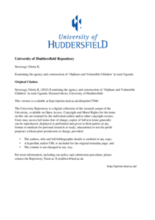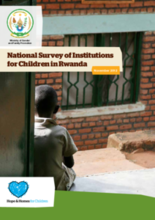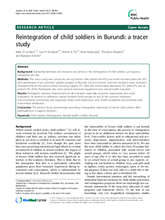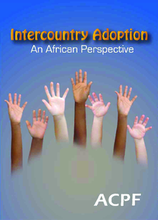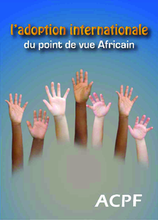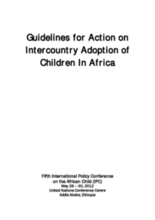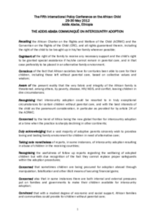Displaying 1321 - 1330 of 1622
Focussing on Sheema district in rural Uganda, this study sought to give voice to ‘OVC’ and use their lived experiences to develop a robust framework of care and support.
Hope and Homes for Children, in partnership with the Ministry of Gender and Family Promotion (MIGEPROF), has conducted a national survey of all institutions for children in Rwanda to obtain an accurate picture of the current institutional system and the children living within it which can be used to inform decision-making regarding the implementation of the reform strategy and provide a baseline against which progress can be measured in the future.
In this TED Talk, poet and playwright Lemn Sissay tells his story of growing up in foster care in the UK.
2014 is the time line set to re-unite orphaned children with their families. Already in a period of seven months, two orphanages have been phased out. Officials from the National Commission for Children (NCC) say that in less than two months, two more of the 34 targeted orphanages will have been closed.
This study assesses reintegration trajectories of child soldiers in Burundi several years after demobilization. It looks broadly at socioeconomic and mental health indicators of a large group of former child soldiers and never recruited peers, both of who participated in an economic support program.
This publication was prepared as a background document to inform the discussions and debates during the Fifth International Policy Conference on the African Child held on 29-30 May 2012 in Addis Ababa, Ethiopia. This report examines the rationale behind increasing intercountry adoption in Africa, the main thrust of international standards, the extent and magnitude of African intercountry adoption and its problems and challenges. The paper provides recommendations to this increasing trend and aims to establish a more Pan-African position on the topic of intercountry adoption.
This publication, published in French, was prepared as a background document to inform the discussions and debates during the Fifth International Policy Conference on the African Child held on 29-30 May 2012 in Addis Ababa, Ethiopia. This report examines the rationale behind increasing intercountry adoption in Africa, the main thrust of international standards, the extent and magnitude of African intercountry adoption and its problems and challenges. The paper provides recommendations to this increasing trend and aims to establish a more Pan-African position on the topic of intercountry adoption.
The Guidelines for Action on Intercountry Adoption of Children in Africa was adopted at the Fifth International Policy Conference on the African Child held on 29-30 May 2012 in Addis Ababa, Ethiopia. The objectives of the Guidelines are to facilitate and support the efforts of States to take all appropriate legal, administrative, and other measures to ensure that all persons and organizations involved in the adoption of a child act in conformity with applicable international legal instruments. Recommendations are set forth for central authorities and accredited bodies.
In the recently released outcome document of the Fifth International Policy Conference on the African Child, conference delegates call for a reversal of the current trend of resorting to intercountry adoption as a primary solution for African children in need of alternative care, and for giving prime priority to enabling all children in Africa to remain with their families and communities.
In this report, Retrak examines the situation of girls living on the streets in Kampala, Uganda and Addis Ababa, Ethiopia, and provides key recommendations on the development programs required to address their needs. The report urges for scaling up services, building new facilities for street girls, and building staff capacity to handle issues related to this population.

